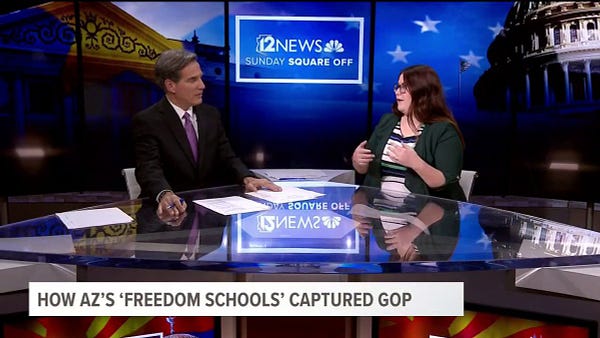The Daily Agenda: Freedom schools aren't free
But Hobbs' budget wouldn't give the well-funded programs more money ... Everyone discovers Congressional District 1 ... And a man finds the missing spoon.
Some of the biggest losers in Gov. Katie Hobbs executive budget proposal are the “freedom schools,” a trio of libertarian centers at the three state universities originally propped up by funding from the billionaire Koch family and other right-wing influencers that lawmakers have since backed with tens of millions in state money since 2015.
Hobbs’ budget proposal would gut the freedom schools, which promote a free-market ideology on campus. The universities would still receive the roughly $12 million in annual funding that was previously set aside for the centers, but that money would no longer be earmarked for exclusive use by the freedom schools.
But the freedom schools have never quite seemed to know what to do with all that cash anyway.


In the past, the freedom schools have funded 10-day spring break trips to India and retreats to Sedona to entice students into taking their classes. (The schools only crank out a handful of degrees per year, according to their annual reports.) They purchased roughly a half-million dollars worth of rare and expensive books, like a $200,000 first edition copy of Adam Smith’s “The Wealth of Nations,” which is kept under lock and key and can only be viewed by appointment, and a first edition of the Federalist Papers that was displayed during the height of the “Hamilton” craze.
More recently, Arizona State University’s freedom school sponsored several high-dollar legislative conferences, including shelling out nearly $100,000 to sponsor the State Policy Network’s annual meeting, and the American Legislative Exchange Council’s annual States and Nation Policy Summit in 2019, despite the sponsorships raising red flags from university officials concerned about the tax implications, activist group Kochs Off Campus shows in its latest report, via public records.
Unlike most legislative appropriations, the freedom schools are not on a “use it or lose it” budget system — the money they receive can be rolled over to the next year. Right now, ASU’s freedom school has a carry-forward balance of about $3.1 million, according to its annual report, though it says it plans to spend all the money by 2025. The annual reports filed by the freedom schools at University of Arizona and Northern Arizona University don’t detail how much they are sitting on in non-lapsing appropriations, though in the past those surpluses have been pretty big.
We’ve been following the freedom schools for some time. Back in his first year as the state’s CEO, former Gov. Doug Ducey went to war with the universities, slashing their budgets by $99 million. The next year, he offered to reduce that cut down to just $74 million. But of that $25 million in restored funding, $5 million was earmarked for the freedom schools.
At the time, few lawmakers knew what freedom schools were or why they were earmarking money for them.
“Many mysterious things happen in the budget process. Many things come and many things go. I have no explanation, other than there’s a lot of weird stuff that shows up (in draft budgets) and many things disappear,” former Senate Appropriations Committee Chair Don Shooter told us in 2016.
Since then, the schools have become lightning rods for political controversy. Republican gubernatorial candidate and former member of the Arizona Board of Regents Karrin Taylor Robson penned an op-ed in the Republic recently calling out Hobbs for trying to defund the centers, which have authored works on “the Demise of Government Schools” and urged Arizona to eliminate the income tax, a failed priority of Ducey’s.
The controversy occasionally spills into K-12 public school districts, like when Tucson Unified adopted a controversial economics class developed by UA’s freedom school that slipped in without being vetted. The school board later nixed the class in the middle of the school year when administrators discovered it was being offered and that the admittedly biased textbook hadn’t actually been approved.
But it seems the freedom schools are here to stay. Last year, lawmakers gave ASU and UA’s freedom schools the authority to draft K-12 civic education standards that provide a discussion of political ideologies “such as communism and totalitarianism that conflict with the principles of freedom and democracy,” including with first-person accounts “of victims of other nations’ governing philosophies.”
After seven years of state funding, the freedom schools have integrated themselves so thoroughly into the university infrastructure that it’s almost impossible to imagine the universities without them.
During a January House Appropriations Committee hearing, ASU President Michael Crow defended the freedom school from Hobbs’ proposed attempt to gut them, saying that it has become “a pride and joy of ASU.” And as lawmakers grilled him about university liberal indoctrination, NAU President José Luis Cruz Rivera pledged to support his campus’ freedom school, saying no matter what lawmakers and the governor decide on the state budget, his campus’ freedom school is also there to stay.
“(It) existed before earmarks… And it will continue to exist regardless of how that funding is made available to NAU,” he said.
Smelling the vulnerability: The race for Congressional District 1 proved to be the state’s closest congressional battle last year, and incumbent Republican Rep. David Schweikert narrowly kept his seat. But after the Democratic runner-up Jevin Hodge announced he wasn’t going to try again for the office, several candidates have jumped into the district, which the DCCC now says it’ll go on the offensive in the district next year. Democratic Rep. Amish Shah announced he will run for the seat. Dr. Andrew Horne, an orthodontist, is also running for the Dem pick. And Adam Metzendorf, who ran in the Dem primary in the district previously, said he is exploring running again now that Hodge is out.


Shaking things up: Gov. Katie Hobbs’ communications director, Murphy Hebert, also left her post after press secretary Josselyn Berry resigned last week. The Governor’s Office moved a few other staffers around: Will Gaona will be deputy chief of staff, with Jennifer Loredo as director of policy, legislative and intergovernmental affairs, and Tracy Lopes as director of community and constituent engagement. The Hobbs administration said Hebert’s departure wasn’t connected to Berry’s tweets, though that seems unlikely.
The state of abortion: Yavapai County Attorney Dennis McGrane now wants to get involved in the upcoming Arizona Supreme Court case over the state’s abortion laws, Capitol Media Services’ Howie Fischer reports. After Attorney General Kris Mayes declined to appeal a lower court ruling that said the state’s more recent 15-week abortion ban was in place instead of an outright ban, the Alliance Defending Freedom jumped in to represent a doctor at a crisis pregnancy center who intervened in the case on behalf of unborn children. McGrane wants to intervene to have the ability to fully enforce the territorial ban. Meanwhile, wait times for abortion care in Tucson have decreased significantly as staffing increased, but patients at the Phoenix Planned Parenthood still have a three-week wait for appointments, the Republic’s Sarah Lapidus reports.
To the courtroom: Hobbs will have to appear in court on Thursday, the same day the Arizona Supreme Court previously set for the execution of death row inmate Aaron Gunches, the Associated Press reports. Hobbs and prisons director Ryan Thornell were ordered by Maricopa County Superior Court Judge Frank Moskowitz to come to court and detail how they aren’t violating victims’ rights by halting executions.
How you vote is on the ballot: Arizona voters will face a question on the 2024 ballot that would preclude ranked-choice voting by only allowing the number of candidates from any party to advance for the number of seats open for that particular race. The measure, House Concurrent Resolution 2033, passed both chambers, and could end up on the ballot at the same time as an effort to install ranked-choice voting here, Bob Christie writes for Capitol Media Services. Those supporting the ranked-choice voting measure say they still need more money for a successful campaign and are still crafting ballot language that could win in Arizona.
Just call an Uber: In Pinal County, felony DUI cases have risen faster than misdemeanor ones and outpaced the area’s population increase, the Republic’s Sasha Hupka reports. It’s not entirely clear why these cases — where a person drives impaired with a kid in the car, with a suspended license or going the wrong way — are going up so much, though Pinal County Attorney Kent Volkmer’s office is starting a new campaign with the message, “Drive drunk or high, people might die."
Goodbye, fun: Arizona State University announced that TikTok will no longer be allowed on ASU-managed devices as the university works to comply with Biden ban of the app for federal contractors, which includes the university, 12News’ John Tanet reports. The school initially said people wouldn’t be able to use the app on school networks, but then walked that part back.

Free Evan: Brittney Griner, the Phoenix Mercury player who was detained in Russia for months on drug charges before she was brought home to the U.S., called for the release of Wall Street Journal reporter Evan Gershkovich, who was detained in Russia in March on espionage charges.
New job alerts: Hobbs made seven judicial appointments to fill spots left open by retirements, promotion and voters un-electing some judges, KTAR reports. To the Maricopa County Superior Court, she appointed Michelle Carson, Marischa H. Gilla, Melody G. Harmon, Amy M. Kalman, Steven W. McCarthy, Colleen O’Donnell-Smith and Melissa M. Zabor.
Bill who?: It’s time for a quick rundown of some bills still moving in the Arizona Legislature.
The Republic’s Mary Jo Pitzl writes about the remaining bills that would affect how schools can operate as lawmakers continue their quests to micromanage education.
Arizona Sen. Jake Hoffman wants to ban diversity, equity and inclusion programs in any government venue, and he quoted Martin Luther King Jr. while advocating for the bill, Fischer reports.
A bill from Republican Sen. Sine Kerr would require even low-risk sex offenders to be listed in a public registry, Isabela Gamez reports in the Mirror.
Booted with speed: Now that a COVID-era ban on removing people from state Medicaid rolls has ended, poor people in five states, including Arizona, stand to lose coverage more quickly than in other states, the New York Times reports. Some states said they would take many months to assess their rolls for any potential removals, while places like Arizona were expected to move swiftly.
Making a martyr: The New York Times’ Jack Healy delves into the case of border rancher George Alan Kelly, who has been charged with murdering Gabriel Cuen-Buitimea, a Mexican man on his land in Santa Cruz County, in January. Kelly’s case has since become right-wing fodder, with people claiming he is the “real victim in a murky tale of death and justice in Arizona’s politically volatile borderlands.”
David gets the landlord involved: After Cochise County Recorder (and interim elections director) David Stevens confronted people gathering signatures for a recall of Supervisor Tom Crosby, the petitioners have been asked by the landowner to not gather signatures in the area, the Herald/Review’s Andrew Paxton reports. While Stevens had said the land near the local post office was federal land, it had a Vermont company listed as its owner. That owner, when contacted by Stevens, said he didn’t want political activity happening on his property.
Keep reading with a 7-day free trial
Subscribe to Arizona Agenda to keep reading this post and get 7 days of free access to the full post archives.







